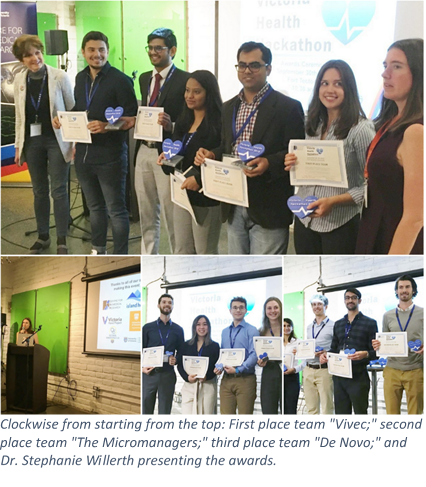Hackathons are a fantastic environment for networking between academia and industry, and a real opportunity for students and young professionals to showcase their skills. On the last weekend of September 2018, the Victoria Health Hackathon was hosted by the University of Victoria’s Centre for Biomedical Research in downtown Victoria. The event brought together esteemed professionals from industry and academia alike, as well as eager students looking to test their skills in teamwork, problem solving, and presenting.
Teams of “hackers” chose from a set of five sponsored challenges presented to them a month in advance of the weekend. They developed a solution to their chosen challenge over the course of the hackathon weekend. As a student and hacker in this event, witnessing the innovative results presented by the teams was inspiring to say the least.
Health Hackathon results
The first place team addressed a challenge sponsored by Island Health which required hackers to develop a notification system for forensic nurses to respond to sexual assault cases in a timely manner. Their solution used an online service connected to mobile phones, and is under serious consideration for implementation by Island Health. Vivek Pissay, the team lead, has been communicating with Island Health and “hopes to see [their solution] in action and potentially…expanded in other areas within Island Health, or even in other regions.”
The second and third place teams developed a hydrogel-based gravity velocity driven sedimentation protocol and a modular filter falcon tube insert, respectively. Both solutions are intended for sorting drug-releasing microspheres by size and are being considered for use in Dr. Stephanie Willerth’s lab at University of Victoria. Other teams tackled real time fall prediction in hospitals, developing terminal devices for prostheses, and non-agitating devices to detect falls for patients with dementia.
Shift in tech company employee recruitment and engagement strategies

Hackathons have been gaining popularity since the early 2000s. Major corporations including Microsoft, PayPal, MasterCard, and AT&T use hackathons both internally and externally, and the trend is inserting itself into the health industry [1]. Notable events include health hackathons hosted by high ranking universities such as MIT, Yale, and Stanford which garner sponsorship packages from companies like Intel and Pfizer[2]–[4]. NSERC, the BC Regenerative Medicine Initiative, Starfish Medical, Island Health, Vancouver Island Life Sciences, VIATEC, and UVic’s Centre for Biomedical Research, Faculty of Engineering, Faculty of Science, Research Partnerships and Knowledge Mobilization, and Centre for Advanced Materials and Related Technologies sponsored the Victoria challenge.
A simple google search of any major medical or pharmaceutical company among the likes of General Electric Healthcare, Philips Healthcare, or Merck paired with the word “hackathon” exposes how companies are utilizing these events for idea generation, recruitment, and finding solutions to some of healthcare’s most challenging problems. If these industry giants are using this strategy to bolster their companies and the surrounding healthcare and tech community, why can’t it work for a budding biomedical and biotech industry in places like Victoria? The results of last month’s event certainly reinforce the viability.
Hackathons not only benefit existing healthcare companies. Teams of hackers are forming tech startup companies based on their improvised solutions. A recent study out of Harvard on the outcomes of 12 health hackathons held in the United States, India, and Uganda showed that 6.2% of hackathon teams go on to file a patent, and 4.2% of teams lead to company formation[5]. One exceptional story from MIT’s 2012 Hacking Medicine competition details a pharmacist and computer science graduate team who developed an automated pharmacy which ships pills in pre-sorted packages[6]. The team grew their business, PillPack, until it was acquired by Amazon this year for approximately $1 billion USD. The possibility of forming billion dollar companies from a local hackathon is not very likely, but the possibility of forming startups is exciting and follows suit with the BC Provincial Government’s plan to support tech startups with their BCTech Strategy[7].
By nature, hackathons require attendance and organization from academic and industry professionals. This environment is ideal for students and new grads to seek out opportunity and find potential connections that could have a lasting impact on their careers. As a student competing in the Victoria event, I thoroughly enjoyed getting to develop an idea created solely by our team.
Working in a high pressure scenario to develop a solution that has a real chance at being implemented brings to life how formal education prepares us for work in either industry or academia. Health hackathons are a real window into the local healthcare, biomedical, and biotech industries and attract professionals from all related areas. I look forward to participating in similar events in varying capacities throughout my future career.
[1] “Employers turning to hackathons to find tech talent | The Star.” [Online]. Available: https://www.thestar.com/news/innovation/2016/09/13/employers-turning-to-hackathons-to-find-tech-talent.html. [Accessed: 11-Oct-2018].
[2] “MIT Hacking Medicine.” [Online]. Available: http://hackingmedicine.mit.edu/. [Accessed: 11-Oct-2018].
[3] “2018 Yale Healthcare Hackathon.” [Online]. Available: http://www.yalehackhealth.org/. [Accessed: 11-Oct-2018].
[4] “health++.” [Online]. Available: http://healthplusplus.stanford.edu/. [Accessed: 11-Oct-2018].
[5] K. R. Olson et al., “Health hackathons: theatre or substance? A survey assessment of outcomes from healthcare-focused hackathons in three countries,” BMJ Innov., vol. 3, no. 1, pp. 37–44, 2017.
[6] “Amazon’s PillPack Acquisition All Started With an MIT Hackathon – Bloomberg.” [Online]. Available: https://www.bloomberg.com/news/articles/2018-06-28/amazon-s-pillpack-acquisition-all-started-with-an-mit-hackathon. [Accessed: 11-Oct-2018].
[7] “BCTECH Strategy | Government’s plan to continue growing B.C.’s technology sector.” [Online]. Available: https://bctechstrategy.gov.bc.ca/. [Accessed: 11-Oct-2018].
Brent Godau is a mechanical engineering graduate student at the University of Victoria. He researches biomaterials applications in tissue engineering and advanced drug delivery under the supervision of Dr. Mohsen Akbari.
Title Image: Victoria Health Hackathon
